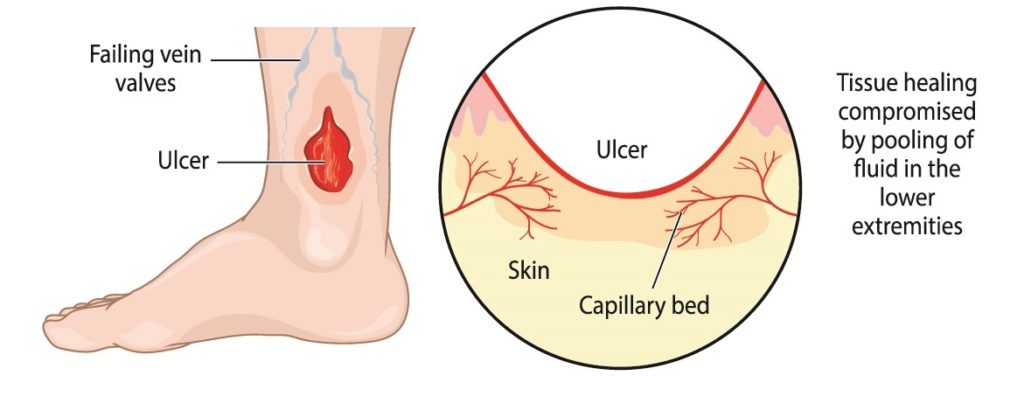It’s normal to think that any cuts, blisters or sores will heal. Our bodies are able to heal themselves with the slightest amount of attention and cleaning. When a wound does not heal in between four and six weeks or becomes redder, swollen and leaking fluid, or exhibits an unpleasant odor, this is a sign that there’s something more serious taking place. A small sore can turn into a leg or foot wound that won’t heal. If not treated this could result in serious complications, and possibly an Amputation.

If you’ve been watching and waiting for a sore to heal, then it may be the right time to seek advice.
Some Wounds Don’t Heal
Understanding why a cut won’t heal will help you and your physician determine the most effective treatment.
First, if you’ve got diabetes, you’re more at risk risk of foot and leg ulcers that don’t heal properly. High blood sugar levels can cause nerve damage (so it’s not possible to feel injuries in the event of an injury) and restrict blood flow, making it difficult for even minor cut to heal.
A slow or inadequate circulation could cause. This can be associated with venous or artery ulcers. If your arteries, veins or vessels don’t function properly and your blood doesn’t supply enough oxygen and nutrients to repair your skin.
If you’re unable move around, then you could be prone to developing pressure ulcers.
In addition to age, other factors, such as certain medicines (such as blood thinners), autoimmunity conditions, or a poor diet, can slow the healing process. Sometimes it’s the combination of the above factors that can cause an injury to not heal.
How Long Should Healing Take and what happens if it doesn’t?
You may be wondering about the “normal” healing process is. It depends on both the severity of your injury and your overall health. A small cut or blister could heal within one or two weeks. But if you’re dealing with a deeper foot ulcer or leg wound won’t heal, it might take up to 12 weeks if things are going well.
Do not wait to seek professional help if you are not seeing any improvement in the next four to six weeks. It’s time to talk to an expert in wound care. The longer the wound remains open the higher the risk.
Find the right support for you
Your body is not telling you it requires your help because it’s not ready to heal. The positive side? There are specialists and treatments that can really make a difference. Our clinic is specialized in treating foot and leg injuries that don’t heal. We collaborate with other medical professionals and devise a plan to give your body the greatest chance of healing and prevent an amputation.
It doesn’t matter if it’s the latest wound dressings, restoring blood flow or even the use of hyperbaric oxygen as a special therapy, there are solutions out there. We’ll be with you in every step, since we believe that no one should confront an injury that won’t heal.
Final Thoughts
A wound that isn’t healing is more than just an injury, it can affect your entire life. But there is possibility. Do not be afraid to seek assistance if the wound or sore on your leg doesn’t heal or if you’ve got an ulcer on your foot that’s not healing. You can lead the life you’ve always wanted without constant pain or stress about a stubborn wound if you act quickly.